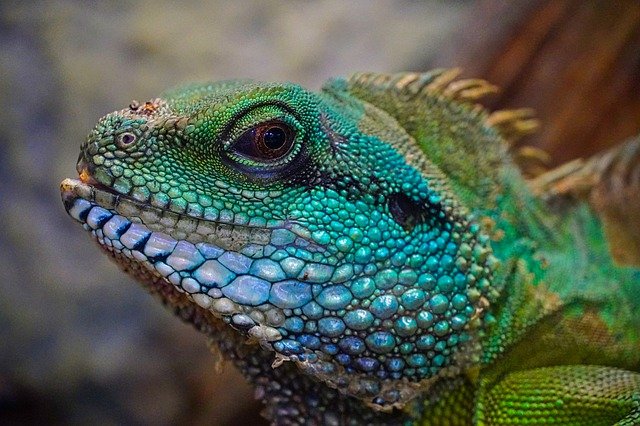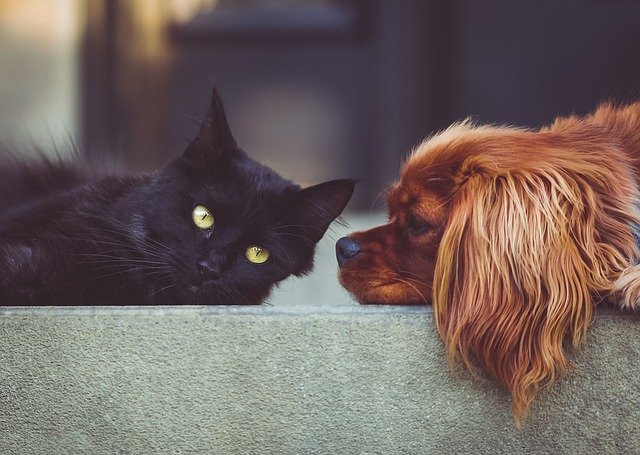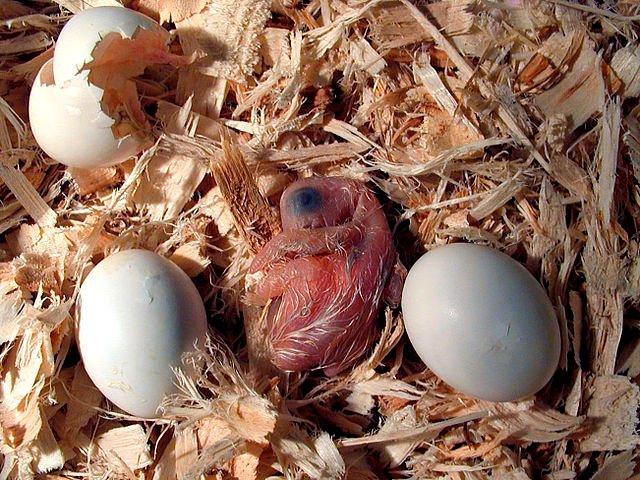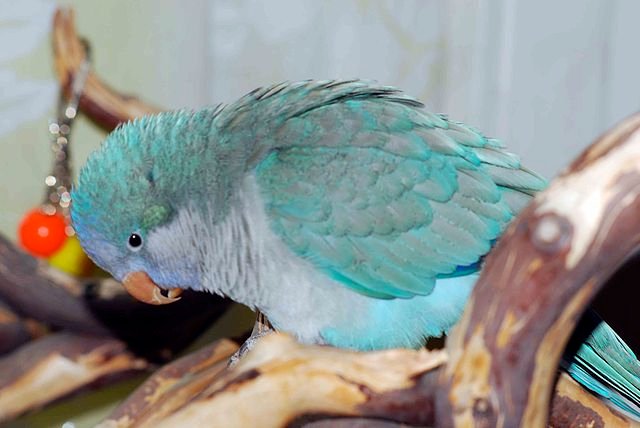You may be wondering if your current pet would do well with a parrot and vice versa. In this article we cover some common household pets and whether or not they’re a good idea to keep with Quaker Parrots.
Quaker Parrot and Cat
As sweet as your kitty may be, it’s long been the advice of aviary professionals that keeping domestic cats and birds together is a bad idea. As we all know, birds are natural prey for a feline. Keeping a parrot in its cage may be a good idea for their own safety, but isn’t a good quality of life for the parrot.
Parrots like to be a part of the family and roam outside their cage often to stretch their wings. Furthermore, even if your cat never gets hold of your parrot, it will likely be doing typical feline behaviors like stalking, which could put your bird in distress. Distress in parrots can lead to health issues and even death.
You may have seen posts on Facebook or videos on TikTok where pet owners keep birds along with cats or dogs. However, these families usually have special circumstances that allow them to constantly supervise their pets, or give them their own dedicated rooms. We don’t know what goes on behind the scenes, however, and even in these cases, accidents happen. It’s not a good quality of life for your pets (or for you) to always be walking on eggshells in your home. Be very cautious if you decide to keep a domestic cat and a Quaker Parrot in the same home.
Quaker Parrots and Dogs
While some dogs may not be quite as predatory with Quaker Parrots as a cat may be, you should still use caution. Small animals of all kinds are the natural prey of canines and whether or not a parrot would do well in a home with dogs is subjective. It all depends on the kind of dog you own.

Maybe you own a lazy Saint Bernard who sunbathes all day, moves slowly, and wouldn’t hurt a fly. In this case, you may be successful owning a parrot and dog at the same time with close supervision. However, there are some breeds and types of dogs that may not be suited to having a bird in the home.
Some breeds that come to mind are herding dogs like German Shepherds and Australian Shepherds. Other breeds that come to mind are hunting breeds like Labrador Retrievers, German Shorthaired Pointers, and the like. These breeds are born with the innate instinct to hunt small animals like birds. Some bully breeds like Staffordshire Terriers should also be considered with discretion. While this advice in general and as animal lovers, we understand that no two dogs are the same, we suggest you be very deliberate about mingling a Quaker Parrot with naturally prey-driven breeds of dog.
Additionally, if your dog has any territorial issues about its food, bedding, crate, or you as the owner, it’s best not to keep a bird. It’s in situations like these where the bird can be severely injured or even killed and is an issue that veterinarians see birds for in the ER often.1
Quaker Parrots and Aquariums
On the bright side, there are some animals that are perfectly safe to keep with birds given you take some simple precautions. Aquariums filled with beautiful fish can add just as much charm to your home as a parrot and both are completely safe to keep together so long as you do the following things.
Be sure to have a properly fitting cover for your aquarium. Parrots enjoy grooming themselves which includes bathing in shallow water. However, your parrot may try to do so in your deeper aquarium which could lead to drowning. A well-fitting lid also ensures that if your parrot perches on side of your aquarium to take a drink, they aren’t ingesting any chemicals you may be using in there that could be harmful to them. Parrots can be curious creatures who don’t know the dangers of electricity, so also be sure that all cables you use for your aquarium are well hidden from them.
My parrots love checking out Fish. And if they see me with my hands in aquarium, they are going for a swim 🙂
Quaker Parrots, Terrariums, and Reptiles
This one is a toss-up. In most cases, it’s absolutely safe to keep birds with small reptiles and other aquarium-style pets. However, in some instances, extra caution should be used. For example, if you own a ball python, also a natural predator of birds, be sure that your python’s enclosure is in a safe space away from your parrot and has a well-fitting lid. It may be wise to have a dedicated room for your reptiles so it’s easy to keep your parrot away from them when he’s roaming the house. Should your parrot decide to perch on the snake’s cage it could become an easy meal for your slithery friend.
Tortoises are herbivores that typically have no issues with birds, but be sure to closely supervise them as accidents can happen such as them stepping on your bird or becoming territorial of their food or area of space. Red-eared sliders and other water turtles are generally safe to be around parrots, but again, make sure you take the proper precautions such as having proper lids and keeping cables out of reach.

What about iguanas or lizards? While medium-sized birds can sometimes do well with iguanas, large birds such as parrots, macaws, cockatoos, and African grays, may be startled at the sight of larger iguanas. Iguanas also appear to get pleasure from laying across bird cages, a habit that puts them in danger of having toes and tails bitten off by the cage dweller.
Quaker Parrots and other bird species together
Quaker Parrots are generally tolerant of other Quakers and other types of birds, but this requires regular supervision as birds can become territorial over their cages and nests. It’s best to assess your current living situation with your birds and make sure that you have strategies for separating them if necessary. Also, keep in mind that Quaker Parrots can live 20-30 years and can be difficult to rehome. It’s especially difficult to find an experienced owner with whom you can be sure the parrot will live out the rest of its life without suffering. These are all things to consider as you add to your aviary family.
Conclusion
When bringing any animal into your home it’s always better to consider what your game plan will be if things don’t work out than to be considering that question after you’ve already brought the pet home and things go wrong.
Even better yet, it’s best to avoid situations that are inherently dangerous for your potential bird altogether. An article by Lafeber Co., a blog run by veterinarians for the welfare of animals, told gruesome tales from the animal emergency room where birds have had limbs completely ripped off because the bird was roaming the floor and approached the dog’s food bowl. Another story tells of a bird parent who left their bird with a friend while on vacation. This friend had a German Shepherd that she left with the feathered friend unsupervised for only a couple of minutes. The bird got startled, took flight, and the dog snatched the bird from the air, killing it instantly.
You may think these instances are flukes and would never happen to you, but they’re called accidents because they’re unexpected. We are human and make mistakes and these mistakes can be very costly for our pets. While we love our animals dearly and can often view them like our children, it can be dangerous to overly humanize them. We must respect their natural instincts and keep these things in mind when housing animals together. Not only for their sake but for ours.
It’s never an ideal situation to have two pets living with you that don’t get along. It not only reduces our pet’s quality of life but ours as well. Worrying about the safety and welfare of our pets is only natural and it’s only amplified when we have a disturbing living situation with our pets at home.
I hope you enjoyed this article and you have some more insight into owning Quaker Parrots with other animals. Have you owned a Quaker Parrot with another animal? How did that work out for you? Tell us in the comments below.




